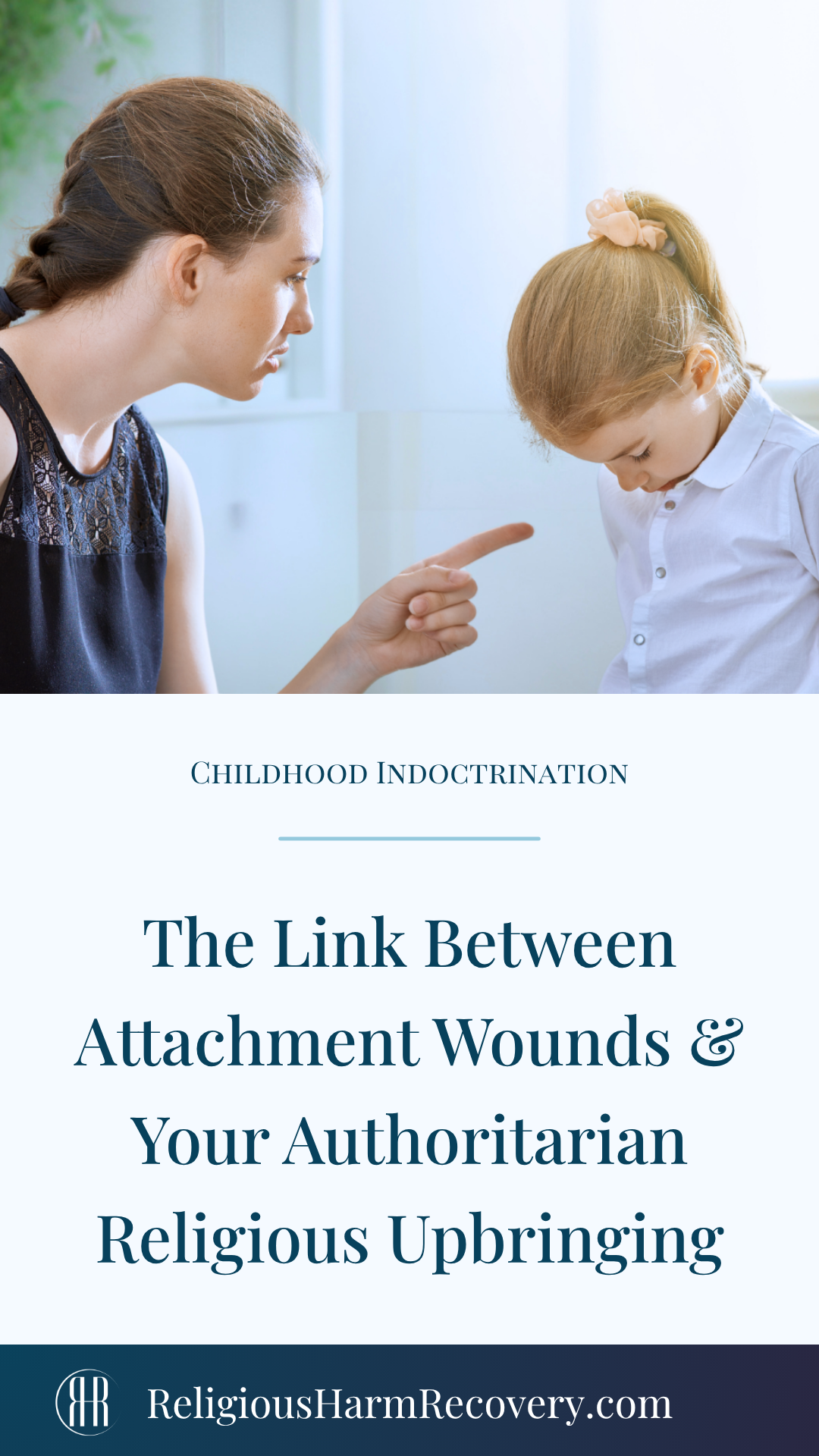How Religious Authoritarian Parenting Creates Attachment Wounds

My personal and professional experiences with religious harm recovery have led me to the conclusion that children who were raised by indoctrinated parents are more likely to develop an insecure attachment style.
Exploring this connection between a high control religious upbringing and attachment wounds has become a cornerstone of my work because I’ve found that only looking at experiences with the religion itself still leaves aspects of core wounding unaddressed.
How we’re raised, especially our earliest experiences with primary attachment figures, sets the stage for everything that follows.
This is why it’s essential to consider the true impact of being raised by parents who have been indoctrinated into a high control religion.
Recovering from religious harm is about so much more than cognitively “deconstructing” our beliefs and critically examining harmful doctrines.
A more complete version of religious harm recovery will also include taking into account how our family upheld harmful teachings in the way we were viewed, parented, and treated on a day-to-day basis.
In this post, I’m focussing specifically on authoritarian parenting practices, a style of parenting that’s often explicitly endorsed within high control religious groups.
What We’ll Be Covering:
How Authoritarian Parenting Looks in Religious Homes
Authoritarian parenting, often called “biblical discipline” in religious circles, is characterized by rigid rules, harsh discipline, and an emphasis on obedience.
Parents who practice authoritarian parenting see themselves as enforcers of strict moral guidelines, often using fear and punishment to ensure compliance.
In homes governed by authoritarianism, behaviors and emotions that are natural for children, such as frustration, tantrums, or sadness, may be labeled as “sin” or signs of a “sin nature.”
As a result, children growing up in these households can experience immense confusion, shame, and fear because what’s a natural part of their development has been re-cast a moral failing.
And because their emotions are often met with harsh discipline in order to set them on the “right path,” they learn to suppress their feelings and engage in performative behaviors.
All of this tends to culminate in attachment wounds and an insecure attachment style that follows them into adulthood, manifesting in challenges related to navigating bother their emotional world and their relationships.
Attachment theory, first developed by John Bowlby in the 1950s and 1960s, continues to be a foundational framework for understanding how we relate to caregivers and navigate relationships throughout life.
Attachment wounds occur when there are ruptures to our foundational needs for safety and connection (Heller, 2019).
Below are some of the most common forms of harmful authoritarian religious parenting practices.
Strict Discipline Based on Biblical Teachings
Authoritarian parents often rely heavily on strict disciplinary methods, interpreting biblical scriptures as mandates for controlling children’s behavior.
For example, they might use Proverbs 13:24 (NIV), which states, “whoever spares the rod hates their children, but the one who loves their children is careful to discipline them,” as justification for corporal punishment.
This approach can lead to a culture of fear where children associate discipline with love and approval.
This form of discipline also veers directly into the realm of physical abuse, although because spanking has been a culturally acceptable form of discipline for generations, most people are unable or unwilling to see it as the abusive behavior that it really is.
Emphasis on Obedience over Understanding
Parents influenced by the teachings of figures like James Dobson or Bill Gothard may prioritize blind obedience over critical thinking.
They’re likely to insist that children to follow rules without questioning their reasoning or purpose, teaching that questioning authority equates to rebellion against God.
My “strong willed” readers will know what I’m talking about here (the ”strong willed child” was popularized by James Dobson in Evangelical circles in the 80’s and 90’s).
This approach to parenting suppresses children’s natural curiosity, discourages them from developing independent thought, and robs them of personal agency.

Public and Private Religious Shaming
Authoritarian parents may use shaming either public or private shaming as a means of controlling or correcting their children’s behavior.
Public shaming often involves pointing out a child’s perceived faults or moral failings in front of family, church members, or community gatherings, which is a way of using social pressure to enforce compliance.
For example, parents might mention poor grades, disobedience, or “sinful” behavior, believing the embarrassment will prevent future misconduct.
Or in private, parents may rebuke their child for emotions or thoughts the parent deems “sinful,” fostering internalized shame in the child as well as a fear of disapproval that stifles emotional growth and self-acceptance
Use of Guilt and Manipulation
Authoritarian parents often use religious manipulation to control their children’s behavior.
They suggest that not meeting parental expectations is like offending god, creating a link between obedience and divine approval.
This manipulation uses a child’s desire to please both earthly parents and a father-like deity, increasing the emotional impact of any perceived disobedience.
For example, these parents might say, “If you truly loved god, you would obey me without question,” or “god is disappointed when you disobey your parents.”
These statements use a child’s spiritual beliefs and need for parental approval as a tool for compliance.
This approach reinforces the parent’s authority and creates a sense of guilt and spiritual inadequacy in their child when their child fails to meet expectations.
Rigid Gender Roles and Expectations
Authoritarian parenting in religious homes often comes with an expectation of strict adherence to traditional gender roles.
For instance, daughters may be taught to prioritize submissiveness and domestic duties, while sons may be encouraged to be authoritarian figures themselves (a.k.a “godly leaders”).
This can restrict children’s freedom to explore their identities and interests, creating a sense of inadequacy if they fail to conform to rigidly prescribed gender roles.
This may also result in more significant trauma as a child develops and comes to realize their sexual orientation or gender identify does not align with their parents’ expectations.
In authoritarian homes, the response to sexual diversity is often cruelty and perhaps even shunning.
Isolation from “Secular” Influences
Authoritarian parents often have strict rules about what media their children may interact with and what types of “influences” they’re allowed to be around.
Often they isolate their children from “secular” influences, including media, peer groups, and educational content that contradicts their religious beliefs.
This can create a bubble where children are only exposed to specific ideologies, limiting their social skills and ability to navigate diverse perspectives.
It also ensures that children grow up without an awareness of the emotional, spiritual and maybe even physical abuse they’re experiencing because, within this carefully curated echo chamber, it all seem “normal.”
Fear of Hell and Punishment
Many authoritarian parents instill a fear of hell as a form of control, suggesting that disobedience not only leads to earthly consequences but also spiritual ones.
They might also threaten their child that they’ll be “left behind” when the rapture comes due to a specific behavior their child was engaging in.
For example: “If Jesus comes back tonight, your dad and I will get taken up to heaven, but you’ll get left behind because you [insert recent behavior].”
This can lead to children experiencing constant anxiety about their moral standing and relationship with god, as they feel they must be “perfect” to avoid eternal punishment.
How Authoritarian Parenting Affects Attachment Styles
In authoritarian homes, children often struggle to express their emotions or needs due to a fear of criticism, rejection, or punishment (Bowlby, 1969; Ainsworth et al., 1978).
And the manifestation of this fear will often take the form of one of the following insecure attachment styles: anxious, avoidant, or disorganized (Main & Solomon, 1986).
This next section gives an overview of each of these attachment styles.
Anxious Attachment
In homes where “honor thy father and mother” means never questioning authority, children may become hypervigilant (Sroufe et al., 2005).
They constantly scan their surroundings to avoid punishment or disapproval.
This hyper-vigilance can lead them to become overly compliant or clingy, fearing punishment or divine consequences for any perceived misstep (Heller, 2019).
As adults, these folks may struggle with people-pleasing, setting boundaries, or expressing their needs.
They often grapple with the question, “who am I?” because, in their quest for stability, they may have molded themselves to become what others want or need, completely negating any connection to their own wants and needs (Johnson, 2008).
Avoidant Attachment
On the other hand, some children learn that keeping an emotional distance is safer (Bowlby, 1969; Ainsworth et al., 1978).
They may grow up believing it’s essential to trust god to meet all their needs or that seeking comfort from others is a sign of emotional or spiritual weakness (Mayfield, 2022).
This belief fosters a reliance on themselves, leading them to view vulnerability as an unacceptable risk.
While praised for their “maturity” or “independence,” this independence often stems from emotional survival rather than genuine confidence (Heller, 2019).
As adults, people with avoidant attachment may prioritize self-sufficiency over emotional intimacy, which can make it challenging to connect deeply with others.
They might form relationships based on doing things for others but struggle to ask for help or rely on others for support (Johnson, 2008).
Disorganized Attachment
In some authoritarian religious homes, the parenting style is so unpredictable or severe that children develop disorganized attachment, an insecure style marked by conflicting behaviors and intense inner turmoil (Main & Solomon, 1986).
Unlike anxious or avoidant attachment, disorganized attachment often arises when children experience a caregiver as both a source of comfort and fear.
For example, a parent may offer warmth one moment but switch to harsh punishment or extreme withdrawal the next, leaving the child uncertain of how to respond (Sroufe et al., 2005).
As adults, folks with disorganized attachment may struggle with chaotic relationship patterns, finding it difficult to trust others yet feeling desperate for connection.
This attachment style can lead to push-pull dynamics, where they seek closeness with others but then push them away out of fear (Heller, 2019; Johnson, 2008).

6 Ways Insecure Attachment Styles Manifest in Adulthood
Growing up in an authoritarian religious household can significantly impact how people relate to others and to themselves once they reach adulthood.
This section will explore in more detail some of the specific ways an insecure attachment style forged by an authoritarian religious upbringing may manifest once these children reach adulthood.
1. Communication Challenges
People raised in authoritarian homes often struggle to communicate their feelings effectively (Bowlby, 1969).
The fear of judgment or punishment instilled in them as children can carry over into adulthood, leading to difficulties in expressing emotions.
Difficulty Expressing Needs
Adults may find it hard to voice their needs or desires, often feeling that their thoughts are invalid or unworthy of attention (Heller, 2019).
This can lead to frustration and resentment in relationships, as partners may feel disconnected or unaware of their needs.
Conflict Avoidance
Many may also avoid conflict at all costs, fearing that disagreement will lead to punishment or rejection.
This avoidance can stifle healthy relationship dynamics, making it challenging to address issues openly (Johnson, 2008).
As a result, unresolved tensions may build over time, leading to further emotional distance between partners.
2. Trust Issues
Insecure attachment styles stemming from authoritarian parenting will often manifest as profound difficulties with trusting others (Main & Solomon, 1986).
Hypervigilance
Those with anxious attachment may become overly sensitive to perceived signs of disapproval or abandonment.
This hypervigilance can create a cycle of anxiety in relationships, where people constantly seek reassurance from their partners (Sroufe et al., 2005).
This need for reassurance can place undue pressure on the relationship and create a sense of instability.
Fear of Vulnerability
On the other hand, people with avoidant attachment are more likely to struggle to let others in, fearing that vulnerability will lead to pain or rejection (Bowlby, 1969).
This fear can hinder the development of deeper emotional connections, leaving both partners feeling unfulfilled.
Their reluctance to share their inner world can prevent the creation of a safe, nurturing environment essential for intimacy.
Chronic Uncertainty
People with a disorganized attachment style might feel chronically uncertain about how they’re feeling, what they need, or how to get those needs met.
They often have a poorly developed radar for who to trust and how deeply to trust (Main & Solomon, 1986).
This often results in a chaotic way of relating to others, perhaps trusting too much too soon followed by intense anxiety about the depth of the relationship, which causes them to abruptly pull back or cut off the other person.
3. Painful Relationship Patterns
Childhood experiences with an authoritarian parent can also lead to recurring patterns in adult relationships that may be detrimental to personal well-being (Heller, 2019).
People-Pleasing Behaviors
Folks with an insecure attachment style may gravitate toward relationships where they feel compelled to please others at the expense of their own needs.
This dynamic can lead to one-sided relationships where their own well-being takes a backseat, resulting in feelings of resentment and burnout.
Over-Functioning
These folks may also become “over-functioners,” taking on excessive responsibility in relationships and feeling compelled to “fix” things for others.
This pattern can stem from a need for control or validation and can lead to emotional exhaustion, as they prioritize solving others’ problems over addressing their own needs.
Relational Instability
They might also experience chronic instability in their relationships, quickly getting swept away in the honeymoon phase as they relish the love and affection they’re receiving but then suddenly distance themselves if they perceive disapproval or conflict.
It’s not uncommon for these folks to then come back around and seek connection again with someone they were once close to because they continue to long for the love and affection that felt so intoxicating early on.

4. Difficulty Regulating Emotions
Many folks raised in authoritarian homes were taught to suppress or ignore their emotions (Bowlby, 1969; Heller, 2019).
Instead of learning to understand and soothe their feelings, they may have been taught that emotions are sinful, dangerous, or a sign of weakness.
As adults, this can make it challenging to handle strong feelings or even recognize what they’re experiencing in the moment.
Emotional Overwhelm
Without early modeling of how to process emotions, people may find themselves quickly overwhelmed by intense feelings.
Moments of conflict or stress can feel unmanageable, leading them to shut down, lash out, or withdraw completely.
Emotional Numbing
Some folks cope by disconnecting entirely from their emotions.
They might appear calm or “together” on the outside while feeling disconnected on the inside.
This numbing can protect them from pain but also blocks access to joy, connection, and authentic self-expression.
Difficulty Naming Feelings
Many struggle to put words to their emotional experiences. Instead of saying “I feel sad,” they might default to saying “I’m fine” or “I’m just tired,” missing opportunities for connection and support.
A great resource for developing a “feelings vocabulary” is the Wheel of Emotions.
5. Diminished Self-Worth
Growing up in authoritarian religious systems often involves deep messages of inherent sinfulness or unworthiness.
Over time, these beliefs can create a fragile sense of self-worth that carries into adulthood.
Settling for Less
Folks with diminished self-worth might accept relationships or situations that don’t meet their needs.
They may believe they don’t deserve kindness, love, or care, which keeps them stuck in unfulfilling or even harmful dynamics.
Over-Apologizing
People often take on blame quickly, apologizing for things that aren’t their responsibility.
This constant apologizing can come from a fear of conflict or a deep belief that they are always at fault.
Difficulty Receiving Care
Many find it uncomfortable to receive love, support, or kindness without feeling guilt or suspicion.
They might question others’ motives or feel undeserving, which can block intimacy and leave them feeling isolated even in close relationships.
6. Disconnect with Your Body
Authoritarian religious upbringings often teach strict control over the body, whether through purity teachings, modesty rules, or messages about bodily desires.
Over time, this can lead to a deep disconnect from physical sensations and needs (Klein, 2019).
Ignoring Physical Cues
Folks may struggle to recognize basic bodily signals like hunger, fullness, fatigue, or pain.
They might push through exhaustion or neglect self-care because they learned to prioritize obedience over listening to their own body.
Discomfort with Physical Intimacy
Many feel uneasy or disconnected during moments of physical closeness, even in safe, loving relationships.
They may freeze or dissociate, finding it difficult to be present and experience pleasure or comfort.
Difficulty Trusting Gut Feelings
Some people have trouble trusting their intuition or bodily “gut” responses.
This disconnect can make it harder to set boundaries, sense danger, or know when a situation feels right or wrong.
Healing from Attachment Insecurity
It’s important to remember that attachment styles can change over time through self-awareness, therapy, and nurturing relationships.
While attachment wounds are often best healed in the context of stable, secure connections, you might find it challenging to build these relationships, especially if you identify with a disorganized attachment style.
Working with a therapist who uses an attachment-oriented approach can help you heal childhood wounds and move toward greater security.
Therapeutic approaches like Emotionally Focused Therapy (EFT) or Attachment-Based Therapy can be especially helpful for addressing these dynamics. I work from an attachment-oriented framework with all my clients and have found it to be one of the most effective ways to move beyond surface-level processing and into deeper healing and recovery work.
Internal Family Systems (“parts work”) is also an excellent therapeutic modality for all attachment styles because it offers opportunities for essential re-parenting of the inner child.
If you have disorganized attachment, parts work may feel less threatening than other approaches since it focuses on connecting with different parts of yourself rather than immediately building deep connection with a therapist, which can sometimes feel overwhelming. IFS is one of the primary treatment modalities I offer to clients.
Additionally, engaging in self-care practices, seeking out healthy relationships, and gradually allowing yourself to be vulnerable can help create a supportive environment for healing.
Some Possible Next Steps:
If this article resonated with you and you’re looking to go deeper, here are a few things that may help:
Resources & References
Content for this article was developed based on my composite clinical experience working with survivors of religious trauma, alongside well-established theories of attachment.
Recommended Reading
If you’re interested in learning more about attachment theory and how it impacts relationships, books like The Power of Attachment by Diane Poole Heller and Hold Me Tight by Sue Johnson offer great starting points.
References
Other Articles About Childhood Indoctrination:
-
The Trauma of Growing Up as a Black Sheep in a Religious Family
This article is for all the children who were labeled “black sheep” because of the inability to conform to the demands of their high-control religious upbringing. This article explores how receiving this label in childhood impacts identity, relationships, and mental health.
-
The Lingering Impact of Emotional Neglect in Religious Homes
In my last post, I talked about how parents influenced by religious indoctrination often lean towards authoritarian parenting styles, which can lead their children to develop insecure attachment patterns. Read it here: How Authoritarian Parenting Creates an Insecure Attachment Style…
-
Why Your Religious Upbringing Left You Feeling Starved For Love
I definitely entered my teen and young adult years feeling “starved for love,” but I didn’t come to understand this about myself until recently. As someone who prided myself on being fiercely independent, even as a teenager, the idea that…


